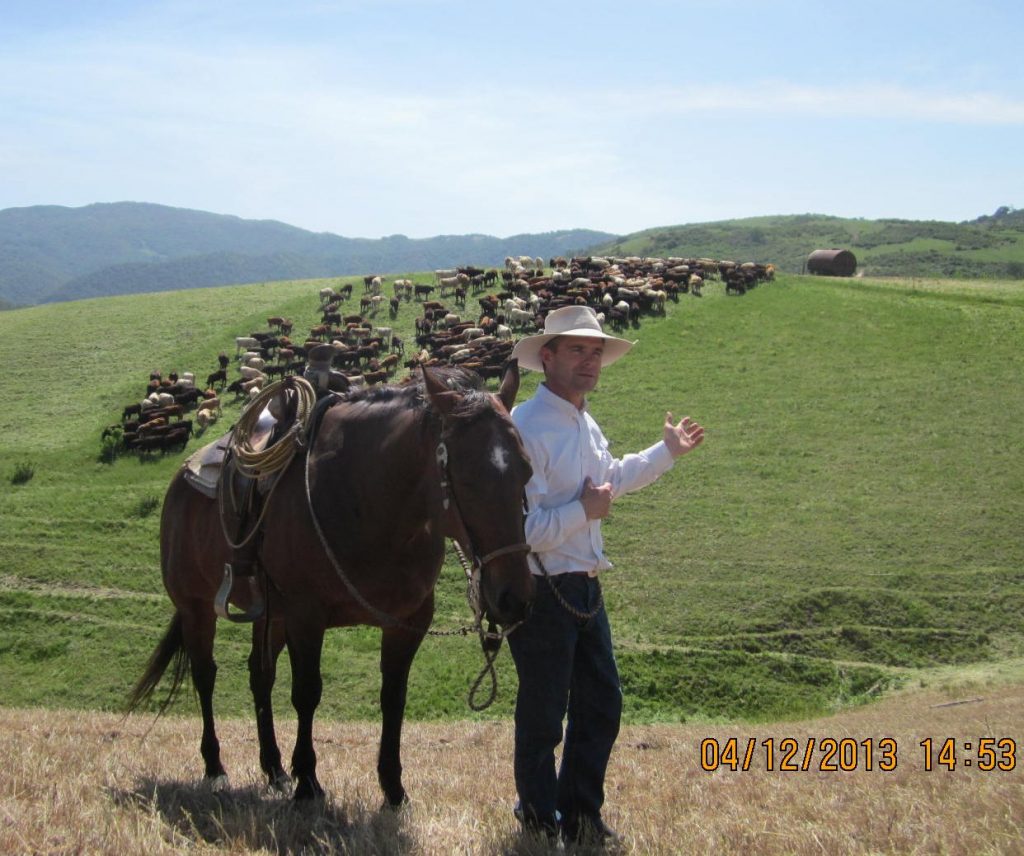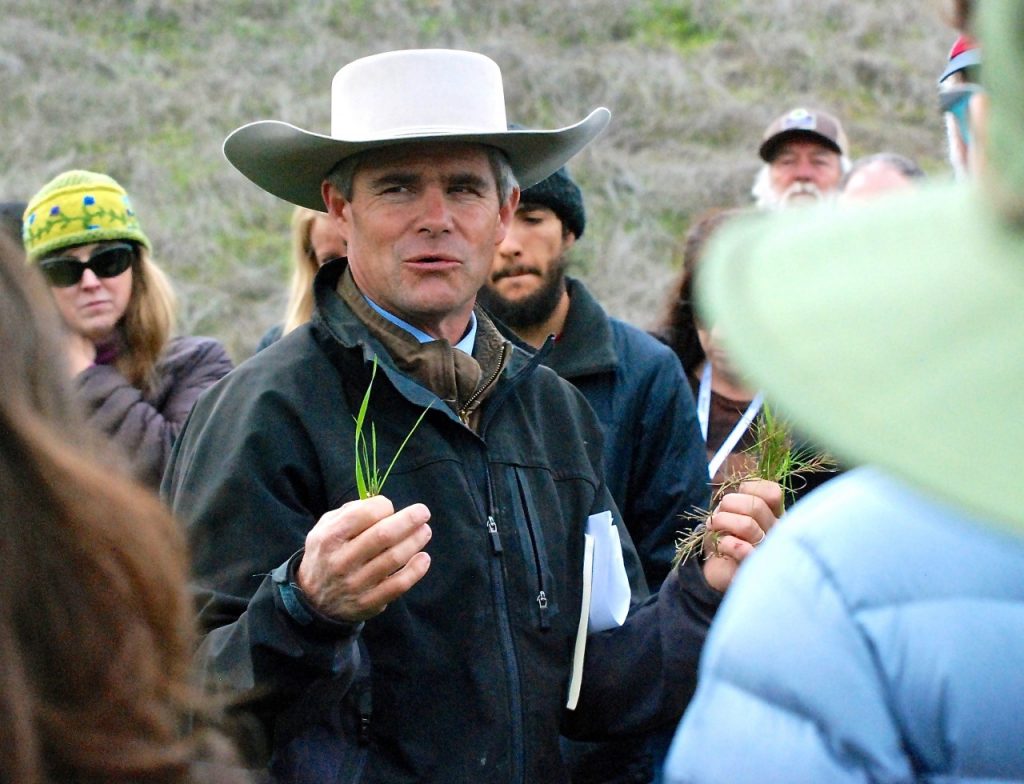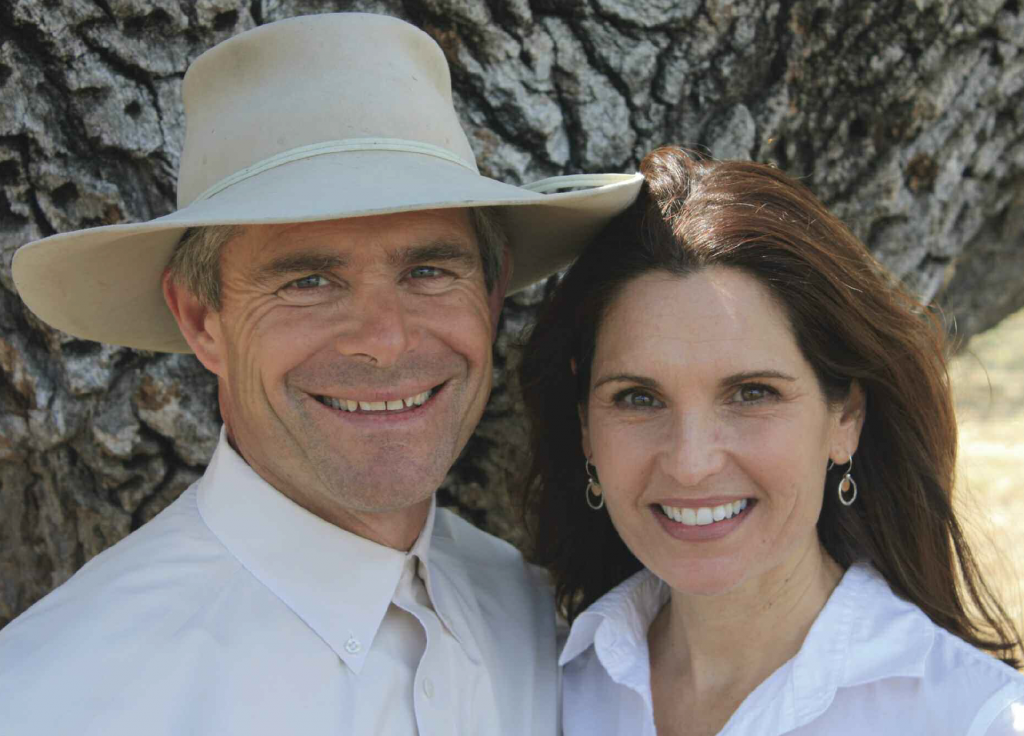 Editor’s Note:
Editor’s Note:
I met Joe Morris on a visit to the Paicines Ranch in Paicines, California for the Rancher-to-Rancher field day. Joe and his wife, Julie, run Morris Grass Fed, a holistically managed cattle operation. He’s also a founding member of Rancher 2 Rancher. Read more here.
When he was younger, Joe worked often with Tom and Bill Dorrance. He sought out Tom, driving over to nearby Merced, to seek his consult on more challenging horses. Bill helped him with roping.
Over the years, Morris has excelled at horsemanship, stockmanship, and holistic management while growing his cattle operations in central coastal California. After my trip to Paicines, we spoke again by phone. This is the second of three installments.
Maddy Butcher: I’d love to hear any anecdotes from your time with Tom that you might like to share.
Joe Morris: Merced, California is pretty hot in the summer. I was working with this horse, Rose. She was very high-strung, very sensitive. She was hard to catch and hard to do things with. Tom was watching her and said, “this is going to be a really good kids’ horse” which seemed crazy to me. But, of course, she did turn out to be a great kids’ horse. We still have her.
 He was giving me suggestions and asking me to work with her in a certain way. He was suggesting doing serpentines, point-to-point, riding in a straight line, riding in a perfect circle.
He was giving me suggestions and asking me to work with her in a certain way. He was suggesting doing serpentines, point-to-point, riding in a straight line, riding in a perfect circle.
Riding straight and riding in perfect circles are simple but hard exercises. You need to be so mindful of horses’ feet and mind. When relaxed, these things are possible. But you don’t necessarily need to struggle or force it to work. If one is constrained, then you can’t relax.
It was a sunny, hot afternoon. He was sitting in his golf cart, had his feet up on the dash, and I realized he was sound asleep. He was just not worried about Rose. Meanwhile, I was so worried. He taught in his sleep. He was that good.
Tom’s sleeping made me laugh. He showed me I could relax, that I can back off, that I can allow it to happen rather than try to make it happen. The difference was game-changing for me.
MB: Tell me more about what you held dear, working with Tom.
JM: Tom could make a game out of things. He’d be creative and fun.
I was working with this horse and we were having trouble changing leads. Meanwhile, there was this burro who liked grain but was hard to catch. Tom suggested I use my horse to catch it, herd it, and so I’d be working my horse like a stock horse or a cutting horse. So, of course, we had to change leads. My horse was good at this game, and things became fun for me. I forgot about the lead changes, and the relationship with my horse improved.

Joe and Julie Morris
Tom was so good at that. He always saw the silver lining. He looked for the silver lining. He built on it until the whole cloud was silver. The horse would then feel good and the person would, too.
There wasn’t a finish point. Every day was an opportunity to figure things out.
When Tom was visiting with the ranch boss, Bill Kane, in Nevada. He would go out to find strays. They would be miles from headquarters. Tom would make a game of bringing them back. He would have all the black ones on one side and all the red ones on another. He would make play out of what some would resign themselves to as just hard work.
I know a bit about brain science, that brains are wired to notice threats. There is a bodily response to identifying threats. But Tom trained himself to look for opportunities, to take pause with threats and look for opportunities to emerge. That’s why things became relaxed, fun, and a game. For others, those situations would be stressful and that would translate directly to the animals. They’re so sensitive.
Tom isn’t responsible for my way of being, but we were kindred spirits. He liked peacefulness, as do I. Tom helped me to understand how to translate my deeper desires into daily practice. I’ve been trying to do that in all areas of my life:
Holistic management
Gospel
Theology
Philosophy.
All have line up to be who I am and to help me help others.
MB: Can you help me understand how these ideas interrelate and how Tom helped you incorporate deeper interests and passions into your routines? I understand you spent two years in Venezuela, living with a poor barrio in Caracas, while volunteering for a project run by the Catholic Church. I’m sure that has help to inform your views on life and daily practices.
JM: Regarding translating deeper desires to daily practices, for example:
The Gospel is all about relationships, to the land, to neighbors, to yourself. The result is peacefulness. We want to be happy, successful, and peaceful people.
Jesus didn’t say, “In this situation, you do X, Y, Z.” He said, “Love your neighbor” One has to figure out how to do that given your X, Y, Z situation. The Gospel is principles.
In a similar way, I learned that I could create a lot of problems if I didn’t have wisdom. Tom showed me ways to approach situations.
Interested in more Dorrance insight and memories? Check out Randy Rieman and Bryan Neubert at our 2017 Best Horse Practices Summit, at which they mesmerized the gathering with their tales.